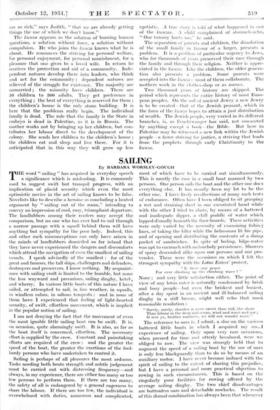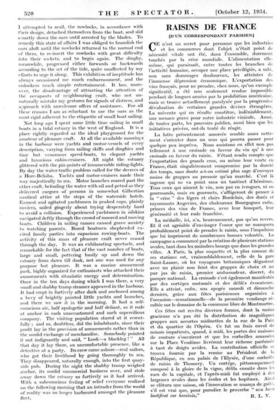SAILING
By BARBARA WORSLEY-GOUGII
THE word " sailing " has acquired in everyday speech a significance which is misleading. It is commonly used to suggest swift but tranquil progress, with an implication of placid security which even the most optimistic novice in the art of sailing knows to be false. Novelists like to describe a heroine as concluding a heated argument by "sailing out of the room," intending to convey an impression of cool, easy, triumphant departure. The landlubbers among their readers may accept the comparison, but no one who has ever had to sail through a narrow passage with a squall behind them will have anything but sympathy for the poor lady. Indeed, this and other such misconceptions can only have arisen in the minds of 'landlubbers domiciled so far inland that they have never experienced the dangers and discomforts which attend the navigation of even the smallest of sailing vessels. I speak advisedly of the smallest : for of the great and famous, the tall ships, challengers and defenders, destroyers and preservers, I know nothing. My acquaint- ance with sailing craft is limited to the humble, but none the less wayward and precarious, sailing dinghy, ketch, and wherry. In various little boats of this nature I have sailed, or attempted to sail, in fine weather, in squalls, in windless calms, in odious tempests : and in none of them have I experienced that feeling of light-hearted security, of swift, effortless movement, which is implicit in the popular notion of sailing.
I am not denying the fact that the movement of even the most ignoble little sailing boat can be swift. It is, on occasion, quite alarmingly swift. It is also, as far as the boat itself is concerned, effortless. The necessary effort is supplied by the crew. Constant and painstaking efforts are required of the crew : and the greater the speed of the boat, the greater the exertions of the fool- hardy persons who have undertaken to control it.
Sailing is perhaps of all pleasures the most arduous. Tasks needing both brute strength and subtle judgement must be carried out with distressing frequency—and always, in my experience, there are either too many or too few persons to perform them. If there are too many, the safety of all is endangered by a general eagerness to share the labour. If there are too few, the individual is overwhelmed with duties, numerous and complicated, most of which have to be carried out simultaneously. This is mostly the case in a small boat manned by two persons. One person sails the boat and the other one docs everything else. It has usually been my lot to be the other one. I have lively recollections of many such tests of endurance. Often have I been obliged to sit grasping a wet and straining sheet in one excoriated hand while with the other I tried to abate, by means of a battered and inadequate dipper, a chill puddle of water which lapped dismally beneath the floor-boards. These activities were only varied by the necessity of examining fishily; lines, of taking the tiller while the helmsman lit his pipe, and of opening and distributing the contents of a damp packet of sandwiches. In spite of baling, bilge-water was apt to encroach with melancholy persistence. Showers of spray descended alike upon our persons and our pro- vender. These were the occasions on which I felt the strongest sympathy with the Lotus Eaters' protest.
"Is there any peace
For ever climbing up the climbing wave 1"
None ; and very little satisfaction either. The point of view of any lotus eater is naturally condemned by brisk and busy people—but even the briskest and busiest, after a day spent in an ancient and ill-balanced sailing dinghy in a stiff breeze, might well echo that most reasonable resolution :
"Surely, surely, slumber is more sweet than toil, the shore Than labour in the deep mid-ocean, wind and wave and mar; 0 rest ye, brother mariners, we will not wander more."
The reference to oars is, I admit, a slur on the various battered little boats in which I acquired my sm..A experience of sailing. Only upon very rare occasions, when pressed for time and utterly becalmed, were we obliged to row. The view was strongly held that to augment the speed of a sailing boat by the use of oars is only less blackguardly than to do so by means of an auxiliary motor. I have never become imbued with the spirit of sailing to the extent of sharing this prejudice, but I have a personal and more practical objection to rowing in such circumstances. This is based on the singularly poor facilities for rowing offered by the average sailing dinghy. The two chief disadvantages are buttonless oars and detachable rowlocks. The result of this dismal combination has always been that whenever I attempted to scull, the rowlocks, in- accordance with their design, detached themselves from the boat, and slid smartly down the oars until arrested by the blades. To remedy this state of affairs I was obliged to brandish the oars aloft until the rowlocks returned to the normal end of them, to re-insert the rowlocks with great difficulty into their sockets, and to begin again. The dinghy, meanwhile, progressed either forwards or backwards according to the set of the tide, quite unaffected by my efforts to urge it along. This exhibition of ineptitude has always occasioned me much embarrassment, and the onlookers much simple entertainment. It has, more-- over, the disadvantage of attracting the attention of the occupants of neighbouring craft, who not un- naturally mistake my gestures for signals Of distress, and approach with unwelcome offers of assistance. For all these reasons I am as reluctant to use the oars as the most rigid adherent to the etiquette of small boat sailing.
Not long ago I spent some little time sailing in small boats in a tidal estuary in the west of England. It is a place rightly regarded as the ideal playground for the amateur of pleasure craft. At all the available moorings' in the harbour were yachts and motor-vessels of every description, varying from sailing skiffs and dinghies and tiny but venomous speed-boats, to elegant yachts and luxurious cabin-cruisers. All night the estuary glittered with the pin-points of innumerable riding-lights. By day the water-traffic problem called for the decrees of a Hore-Belisha. Yachts and motor-cruisers made their way majestically to sea. Motor launches roared past the other craft, befouling the water with oil and petrol as they delivered . cargoes of persons in somewhat Gilbertian nautical attire at the steps of the waterside hotels. Earnest and agitated yachtsmen in peaked caps, plainly novices, sailed gingerly about trying desperately hard to avoid a collision. Experienced yachtsmen in oilskins navigated deftly through the crowd of moored and moving boats. Children in sailing canoes caused grave anxiety to Watching parents. Bored " boatmen shepherded ex- cited family parties into capacious rowing-boats. The activity of this mass of pleasure craft never ceased through the day. It was an exhilarating spectacle, and remarkable for the fact that of the vast number of boats, large and small, pottering busily up and down the' estuary from dawn till dusk, not one was used for any purpose but pleasure. It was a marine amusement park, highly organized for enthusiasts who attacked their amusements with ritualistic energy and determination.- Once in the ten days during which I was there, a very small and shabby tramp steamer appeared in the harbour.. It had crept in furtively after dark and anchored among a bevy of brightly painted . little yachts and launches,' and there we saw it in the morning. It had a self- conscious air, half apologetic and half defiant,. as it rode at anchor in such unaccustomed and such supercilious company. The visiting population stared at it resent- fully ; and so, doubtless, did the inhabitants, since their profit lay in the provision of amusements rather than in the sordid exchange of merchandise. Somebody pointed it out indignantly and said, " Look—a blackleg ! " All that day it lay there, an uncomfortable presence, like a detective at a party. Its crew came ashore—real sailors, who got their livelihood by going thoroughly to sea.
They disappeared, naturally enough, into the first quay- side pub. During the night the shabby tramp weighed anchor, its sordid commercial business over, and stole away down the estuary as furtively as it had arrived: With a subconscious feeling of relief everyone realized on the following morning that an intruder from the world of reality was no longer harboured itmijingst the pleasure fleet.















































 Previous page
Previous page